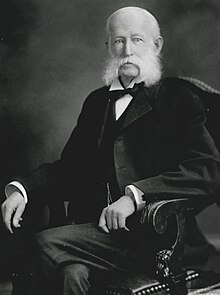John W. Foster
John Watson Foster (born March 2, 1836 in Pike County , Indiana , † November 15, 1917 in Washington, DC ) was an American journalist, army officer and politician who served as Secretary of State in the cabinet of President Benjamin Harrison .
John Foster, who grew up in Evansville , graduated from the University of Indiana in 1855 . He attended the Law School of Harvard University and then began, although he was never formally incorporated into a Bar Association to practice as a lawyer in Evansville. During the civil war he joined the Union Army and initially held the rank of major ; later he rose to colonel after the successful capture of Fort Donelson . He commanded the 136th Indiana Volunteer Infantry Regiment and later a brigade.
After retiring from the military, Foster returned to Indiana, where he worked as an editor for the Evansville Daily Journal , which, under his direction, became a Republican organ . In 1869 he was appointed envoy to Mexico by President Ulysses S. Grant ; after eleven years in this post Grants successor threw him Rutherford B. Hayes to the post of Ambassador in Russia , but where he served only until 1,881th Between 1883 and 1885 he finally served as ambassador to Spain after being appointed by President Chester A. Arthur .
From 1885 Foster lived again in the United States and went back to his legal work until he was appointed special ambassador by President Harrison in 1890 and in this capacity negotiated contracts with Spain, Russia and Great Britain . Two years later, in June 1892, Harrison took him to his cabinet as the successor to the resigned Secretary of State James G. Blaine . There Foster remained after Harrison's defeat in the presidential election of the same year against Grover Cleveland only until February 1893. During this time he dealt with the possible annexation of the Kingdom of Hawaii and a Chilean attack on American sailors.
Even after his time in the federal government, Foster remained active as a diplomat. In 1895 he represented China's interests in peace negotiations to end the Sino-Japanese War . For President William McKinley he worked as a special envoy in Great Britain and Russia, his successor Theodore Roosevelt named him head of the US commission in negotiations with Canada in 1903. He also acted once again as a representative of China at the second Hague Peace Conference in 1907 .
Foster authored numerous books on diplomatic subjects. He co-founded the American Society of International Law in 1906 and the Carnegie Endowment for International Peace (1910). Although he leaned toward pacifism in his later years , he still supported the United States' entry into the First World War . Before it ended, he died in Washington in November 1917. At that time, his son-in-law Robert Lansing was US Secretary of State; his grandson John Foster Dulles was later to hold this office.
literature
- Michael J. Devine: John W. Foster. In: Edward S. Mihalkanin (Ed.): American Statesmen: Secretaries of State from John Jay to Colin Powell . Greenwood Publishing 2004, ISBN 978-0-313-30828-4 , pp. 213-219.
Web links
- John W. Foster in the Miller Center of Public Affairs of the University of Virginia (English)
- John W. Foster in the database of Find a Grave (English)
| personal data | |
|---|---|
| SURNAME | Foster, John W. |
| ALTERNATIVE NAMES | Foster, John Watson (full name) |
| BRIEF DESCRIPTION | American politician and diplomat |
| DATE OF BIRTH | March 2, 1836 |
| PLACE OF BIRTH | Pike County , Indiana |
| DATE OF DEATH | November 15, 1917 |
| Place of death | Washington, DC |

